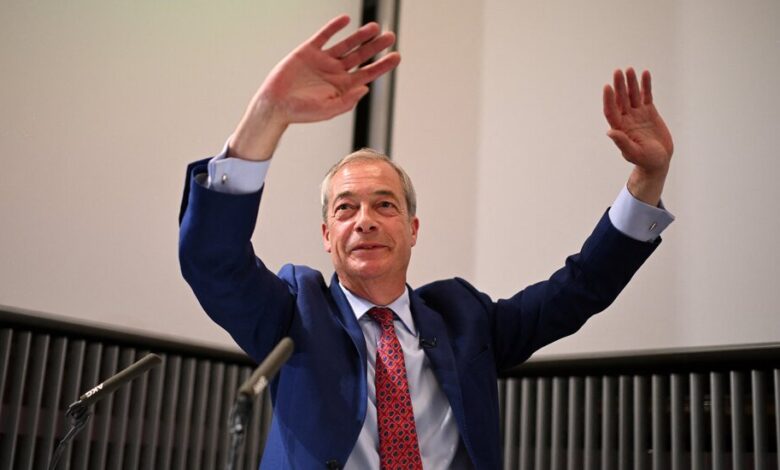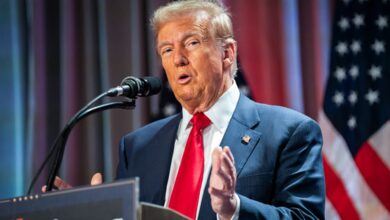Farage and Future of Britain’s Conservative Party

At first, Nigel Farage kept his cool. When protesters disrupted an election victory speech by Mr. Farage, Britain’s veteran political disrupter, anti-immigrant activist and ally of former president Donald J. Trump, he ignored them.
But as the chaos persisted at the media conference on Friday, Mr. Farage began heckling back, drowning out critics by shouting “boring!” into the microphone no fewer than nine times.
With Mr. Farage around, things are rarely boring, however, as Britain’s center-right Conservative Party has just discovered to its cost.
Driven from power after 14 years by a Labour Party landslide, the Conservatives collapsed to their worst defeat in modern history, a stunning loss that has left the party’s remnants in disarray. By contrast, Mr. Farage’s small insurgent party, Reform U.K., is on a roll and has elevated him to a central determinant of the future of Britain’s political right — and perhaps the overall direction of the country.
His presence on the political scene, and his harsh, anti-immigration rhetoric, could have a crucial influence on the trajectory of the Conservatives, whose leader, the former prime minister, Rishi Sunak, said on Friday that he would stand aside once a successor was chosen.
Not only did Reform candidates win five Parliament seats — including Mr. Farage, for the first time after eight attempts — but the party also secured around 14 percent of the vote nationwide. By that measure, Reform was the third most successful party in Britain, inviting comparisons to France’s burgeoning right-wing National Rally party.
“Reform have a foundation to build a serious challenge to not just the Conservatives, but also to Keir Starmer and the Labour Party,” said Matthew Goodwin, a professor of politics at the University of Kent, referring to Britain’s new Labour prime minister. “The question is: Can Nigel Farage put in place an organization and a party structure and a professional operation that is capable of delivering on that which, historically, he’s struggled to do with his previous parties.”
Bombastic, pugilistic and charismatic, Mr. Farage, 60, is a polarizing figure who has long been an irritant to the Conservative Party, which he quit in 1992. During that time, he and his allies have often been dismissed and ridiculed — including once by David Cameron, a former leader who called supporters of the U.K. Independence Party, or UKIP, that Mr. Farage then led “fruitcakes, loonies and closet racists.”
But it was pressure from UKIP that forced Mr. Cameron to promise a referendum on Brexit that he went on to lose in 2016, ending his time in Downing Street.
Recently, Mr. Farage had retreated from politics and decided to run in the general election only at the 11th hour. But his impact was electric, his campaign against immigration touching a raw nerve among Conservatives, whose government has presided over a tripling of legal migration since Britain quit the European Union.
“He’s got that common touch,” said Tim Bale, professor of politics at Queen Mary University of London. “He’s a consummate political communicator and has the charisma that many more mainstream politicians — because they have to deal with real issues instead of confected ones — find difficult to match.”
Some right-wing Conservatives would like to invite Mr. Farage back into their party. Others fear he would repel their moderate voters.
He has suggested that Reform could supplant the Conservatives and that he could even stage a takeover of the party.
But without doing either, he already has proved the threat he poses.
In 2019 the Brexit Party, which Mr. Farage then led, chose not to run candidates against many Conservative lawmakers, avoiding a risk that the right-wing vote would split and helping Boris Johnson, a former prime minister, to a landslide victory.
Last week Mr. Farage’s new party fought the election all across the country, costing the Tories dozens of seats. Professor Goodwin calculated that in around 180 electoral districts the vote for Reform was larger than the margin of defeat for the Conservatives.
“They have problems on multiple sides,” said Professor Goodwin, noting that the Conservatives had lost votes to Labour and the centrist Liberal Democrats, “but Farage is by far the biggest problem facing the Conservatives.”
The party now faces a critical decision on who should lead them and what type of politics to embrace.
One faction wants a shift to the right to combat Reform, which, in the general election, ate away at the Conservative Party’s vote in Brexit-supporting areas in the north and the middle of the country, often easing Labour’s path to victory. Professor Goodwin argued that, after Brexit, Conservative Party support is now more concentrated among voters who are more socially conservative and hostile to Europe.
But the Tories also lost votes to Labour and to the small, pro-European and centrist Liberal Democrats who won 72 seats by concentrating their campaigning in Conservative heartland districts in more socially liberal southern England.
“The Conservatives lost this election on two fronts, but they seem far more concerned with one front than the other,” said Professor Bale. Conservatives seem to blame Reform for their defeat, he said, while ignoring the fact that right-wing policies they promised to counter the threat from Mr. Farage had cost them votes in the political center.
The final choice on who becomes Conservative leader is made by party members who tend to be older and more right-wing than average Britons. “It’s difficult to imagine that a more moderate Conservative is going to be selected by a membership that is so ideologically and demographically unrepresentative of the average voter,” said Professor Bale.
To complicate matters for the moderates, its pool of credible candidates shrank when Penny Mordaunt, a senior cabinet minister, lost her seat in the election, taking her out of contention.
That strengthened the prospects of right-wing contenders including Priti Patel, a former home secretary; Kemi Badenoch, a former business and trade secretary; and Suella Braverman, another former home secretary. Some of her rhetoric has echoed that of Mr. Farage and she has described the arrival of asylum seekers in small boats on Britain’s southern coast as an “invasion.”
Some Conservatives hope the scandal-prone but charismatic Mr. Johnson — who did not run in the election — could eventually return to combat the threat from Reform.
The contender most open to inviting Mr. Farage into Conservative ranks is Ms. Braverman, and analysts do not rate as likely her chances of becoming leader. Most of her rivals are wary of Mr. Farage, sensing perhaps that he would be well-placed to eclipse them.
“I don’t think you are going to see a Farage-involved Conservative Party for a long time; he just doesn’t believe in the Conservative Party,” said Professor Goodwin.
Speaking before the election, Mr. Farage told The New York Times that he “genuinely cannot see that the Conservative Party as we know it is fit for purpose in any way at all: Brexit highlighted the divisions between the two very clear wings.” Asked whether he could rejoin it, Mr. Farage said: “It’s not going to happen.”
Assuming that is correct, much rests on his ability to turn the upstart Reform U.K., which has only a skeletal infrastructure, into a force able to challenge in the next general election, which must take place by 2029.
That he can is far from certain. In municipal elections Reform has performed significantly worse than UKIP did, suggesting that its activist base is patchy and demonstrating that it is what Professor Bale calls an “AstroTurf party, rather than a grass-roots one.”
Racist and homophobic comments made by some of Reform’s campaigners and candidates have prompted outrage, underscoring its difficulty in vetting key supporters.
And Mr. Farage, as Reform’s leader, has struggled to delegate or share the limelight. He also has a reputation for arguing with colleagues.
Mr. Farage “clearly does find it quite difficult to brook any kind of opposition or alternative direction for the party suggested by anyone else,” said Professor Bale.
“He is the ultimate one-man band.”






